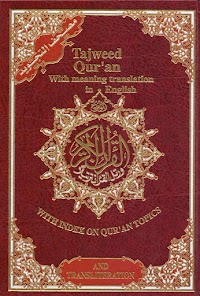Abu Khaisamah Zuhair Bin Harb Al-Nisai
Language: English | Format: PDF | Pages: 40 | Size: 1 MB
This treatise is comprised of a collection of ahaadeeth (sayings of the
Prophet) and athaar (sayings of the Salaf) on the subject of Islaamic
Knowledge. By reading the various narrations, it is hoped that the
reader will benefit and reflect on the merits and virtues of seeking,
acquiring and teaching knowledge. The treatise also provides a
first-hand look on how the Salaf’s attitude was with respect to
knowledge – how they sought it, how they learned it and how they taught
it to others. There are several narrations, also, that give us a
description of the characteristics of some of the Salaf, their knowledge
and their virtues.
Therefore, this treatise is of the utmost
importance, as it provides the reader with an account of the Salaf –
those whom we are obligated to follow and take their example. And it
deals with one of the most important topics in Islaam, which is
Knowledge, since knowledge is the foundation that is required before
doing all sayings and actions. Al-Haafidh Ibn ‘Abd-il-Barr said: “The
scholars have unanimously agreed that there is from knowledge that which
is a specified obligation upon every individual with respect to himself
(fard ‘ayn) and that which is a collective obligation (fard kifaayah) –
if someone rises to fulfill it, its obligation becomes withdrawn from
the remaining people of that area.”
The treatise has been verified by the
great scholar of our time, Imaam Muhammad Naasir-ud-Deen Al-Albaanee. He
has provided gradings for many of the narrations as well as notes and
commentaries that give an explanation for some of these narrations.
A BRIEF BIOGRAPHY OF THE AUTHOR
He was Abu Khaithama Zuhair Ibn Harb Ibn Shadaad An-Nasaa’ee. He was a
great Haafidh, reliable in narration and firm in memory. He narrated
hadeeth from many scholars, the likes of Sufyaan Ibn ‘Uyainah, Hushaim
Ibn Basheer, Yahyaa Ibn Sa’eed Al-Qattaan, ‘Abd-ur-Rahmaan Ibn Mahdee
and Wakee’.
Similarly, many scholars narrated from
him, such as Al-Bukhaaree and Muslim, the latter of whom reported so
many hadeeth on his authority, that they number past a thousand. The
scholars agree unanimously upon his reliability and trustworthiness (in
the field of hadeeth).
Ibn Hibbaan (rahimahullaah)) said of him:
“He was precise and accurate in memory. And he was one of the close companions of Ahmad and Yahyaa Ibn Ma’een.”
Al-Khateeb Al-Baghdaadee (rahimahullaah) said:
“He was reliable, trustworthy, possessed good memory and he was precise
(in narration). He was born in the year 160H and died in the year 234H.
May Allaah have mercy on him.
–
REFERENCE INDEX
1. Chain of Narration back to the Author
2. Narrations on the Merits of Acquiring and Spreading Knowledge
3. The Modesty of some of the Salaf in Refraining from Speaking
4. Narrations and Commentary on the Forbiddance/Allowance of writing hadeeth
5. The Tafseer of the ayah: “And make us leaders of the Muttaqoon”
6. From the virtues of Sa’eed Ibn Jubair and Ibraaheem An-Nakha’ee
7. The Travel of one of the Companions to Egypt for obtaining one hadeeth
8. The Dictation of some of the Salaf to their students
9. Tafseer of ”Those who are miserly and enjoin miserliness upon the people”
10. The Striving of Mak-hool to gather Knowledge from different lands
11. Meaning of “ayah” in the hadeeth: “Convey from me even if it is one ayah”
12. From the Virtues of Ibn ‘Abbaas and Ibn Mas’ood (radyAllaahu ‘anhum)
13. ‘Umar’s Knowledge compared to the Knowledge of the People in his time
14. Who are “those in authority amongst you” mentioned in the ayah?
15. Bringing life to the Hadeeth is through Reminding one another of them
16. Refraining from answering questions on things that never occurred
17. Tafseer of the ayah: “Stand out firmly for justice, as witnesses to Allaah”
18. Six Companions of the Prophet whose Knowledge used to be sought
19. Abu Sa’eed on memorizing hadeeth but not writing them down
20. The Reason why Abu Hurairah narrated so many hadeeth
21. The Forbiddance of Fatiguing the people with too much Speech
22. Grading of the hadeeth: “He would hate that people walk behind him”
23. Narrations on Reporting the hadeeth according to their Meanings
24. Ibn Mas’ood forewarns: Many Speakers but few Scholars in the Last Days
25. Narrations and Commentary on some of the Salaf erasing their Books
26. The Snatching away of Knowledge is through the Death of the Scholars
27. ‘Aasim Ibn Damurah forbids people from walking behind Sa’eed Ibn Jubair
28. ‘Alee on not knowing what Abrogates from what is Abrogated
29. The Salaf on Narrating hadeeth according to their Wordings or Meanings
29. Recording the First Portions of Hadeeth
30. Narrations on the Forbiddance of Concealing Knowledge
31. Authentication of the hadeeth: “There are two types of greedy people
32. Narrations on the Allowance/Forbiddance of Recording Hadeeth
33. Abu Hurairah permits a book of hadeeth written on his authority be reported
34. The Salaf’s hatred of people walking behind them
35. Grading of the hadeeth: “The example of one who acquired knowledge…”
–
Books, Faith, Future, Islam, Religion, Education









Post a Comment
EmoticonClick to see the code!
To insert emoticon you must added at least one space before the code.